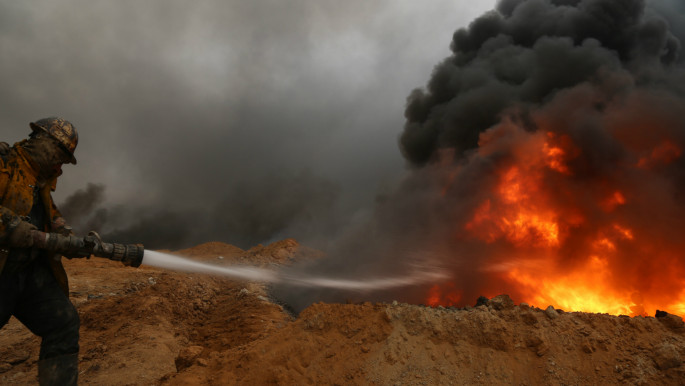Mosul's Old City in sight, despite civilian airstrike deaths
Iraqi government forces have begun to surround Mosul's labyrinthine Old City in anticipation that it is where the Islamic State [IS] group fighters based here will make their final stand.
Soldiers from the Rapid Response Division have captured Mosul's train station and its football stadium in recent days, as pressure has grown on the Iraqi military over civilian casualties.
The elite Ministry of Interior unit will continue to advance north, until Mosul's Old City is completely surrounded.
Commanders told The New Arab that a corridor would be left open to allow civilians to flee.
Journalists were, however, denied access to Mosul's al-Jadid neighbourhood, where a coalition airstrike is believed to have killed more then 100 civilians on March 17.
The allegations led to the Iraqi Counter Terrorism Services (ICTS), the elite unit in control of the area, pausing operations while an investigation was carried out.
A coalition spokesman told reporters any casualties were "the result of fighting an evil enemy in a dense urban environment where [IS] is using civilians as human shields".
That lull in the attack did not, however, apply to the ERD, which operates independently of coalition air support and with the support of Iraq's Federal Police.
Some ERD commanders, however, are critical of the Federal Police's support.
Twitter Post
|
Major Ahmed, of the ERD's 1st Brigade, said the some Federal Police units tasked with holding ground captured by the ERD overnight have been withdrawing and ceding newly fought territory to the Islamic State group.
"My men are dying for these streets and they [the Federal Police] are just giving it away."
The Rapid Response Division, which numbers around 3,500, has seen its role grow exponentially as fighting has moved into the city's west, and as the ICTS have taken on a more supportive role in the operation.
Though the fall of IS in Mosul is a forgone conclusion in the eyes of many, Lieutenant Colonel Abdel Amir al-Mohammedawi warned against too urgent an assault on the old city, where narrow streets, dark alleys and tight corners make it difficult for large armoured vehicles to progress, forcing foot patrols to risk deadly encounters against insurgent fighters in the casbah, much of which is believed to be rigged with improvised explosive devices.
"We favour a slow and careful fight in the old city; we don't want our men to get hurt," Mohammedawi told The New Arab.
"We could take it in a week, if we wanted to, but we would take a lot of casualties and cause much damage to the Old City."
The Old City is the most densely populated part of Mosul.
As many as 400,000 civilians are believed trapped here. At the city's heart is the Grand Mosque of Al-Nuri, where Abu Bakr Al-Baghdadi declared the caliphate in 2014.
Its capture will serve as a huge symbolic defeat for the Islamic State group.
 |
| The blaze has finally been put out following months of dangerous firefighting carried out by specialist teams from Baghdad [Anadolu] |
South of Mosul, in the town of Qayarrah, which was recaptured from IS in August, the last of 19 oil wells set alight by IS militants as they retreated from the town was extinguished on Tuesday.
The Ministry of Oil announced that the blaze, billowing thick black clouds which became a hallmark of IS' toxic legacy, had finally been put out after months of dangerous firefighting carried out by specialist teams from Baghdad.
The wells had been burning for close to nine months, costing the local economy millions in potential oil revenue and leaving a poisonous darkness looming over the town long after its liberation from the Islamic State group.
Gareth Browne is reporting from the front lines of the fight to retake Mosul from the Islamic State group. Follow him on Twitter: @BrowneGareth

![Palestinians mourned the victims of an Israeli strike on Deir al-Balah [Getty]](/sites/default/files/styles/image_684x385/public/2024-11/GettyImages-2182362043.jpg?h=199d8c1f&itok=xSHZFbmc)


![The law could be enforced against teachers without prior notice [Getty]](/sites/default/files/styles/image_684x385/public/2178740715.jpeg?h=a5f2f23a&itok=hnqrCS4x)
 Follow the Middle East's top stories in English at The New Arab on Google News
Follow the Middle East's top stories in English at The New Arab on Google News

![Palestinian journalists in West Bank [Getty]](/sites/default/files/styles/image_330x185/public/2167088057.jpeg?h=a5f2f23a&itok=smdkN-46)
